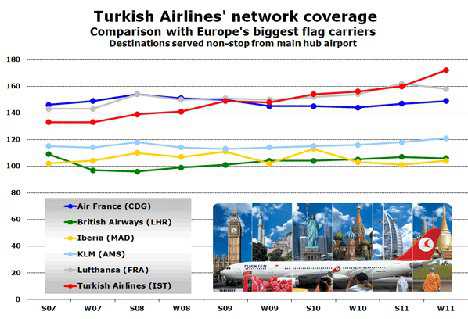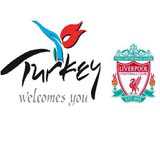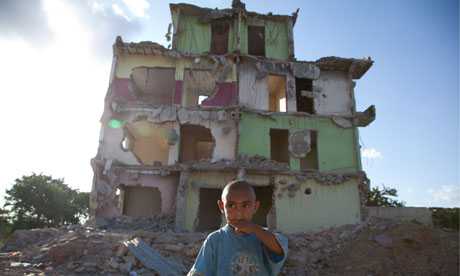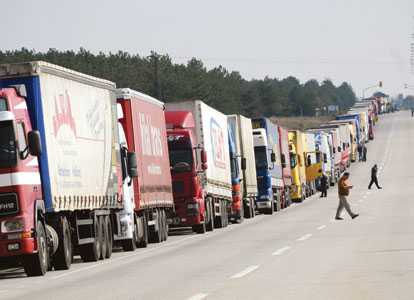BBC News, Istanbul
![]()
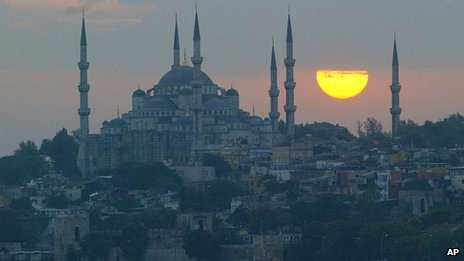
The eurozone crisis seems to show no sign of stopping, but for some countries outside the European Union, like Turkey, the appeal of membership remains strong.
If you put your mind to it, you can write popular music lyrics about pretty much anything – as the lyricist behind the unwarranted bravado of “we’re going to hang out the washing on the Siegfried line” could tell you.
When British forces recaptured the strategically important town of al-Burdi on the coast of Libya during World War II the event was swiftly celebrated with the breezy toe-tapper: “Where do we go from ‘ere, Now that we’ve captured Bardia.”
The Anglicised pronunciation made it rhyme of course, but it also celebrated a sort of high-handed genius for making those foreign place names sit more comfortably on the colonialist tongue.
|
|
But surely the most improbable source of musical inspiration of all time is the shifting historical identity of the great Turkish city of Istanbul which straddles the Bosphorus and links Europe to Asia.
In the late 1920s one of America’s best-known jazz orchestras recorded a song commemorating the city’s old name – “Constantinople”.
It has not dated well – you sing the name out in full and then the rest of the chorus consists of spelling it out at dizzying speed: “C-o-n-s-t-a-n-t-i-n-o-p-l-e.”
It probably was not written with any real political intent but it did commemorate the fact that before the city was conquered by the Muslim Ottoman Turks, it had served as the capital of the Byzantine Empire, that wobbly Christian edifice built on the ruins of Rome.
A few years later a sort of musical rebuttal was produced which became a much bigger hit.
It was called “Istanbul, not Constantinople” and contains the immortal line “Why did Constantinople get the works, that’s nobody’s business but the Turks.”
It was written incidentally by a Northern Irish songwriter called Jimmy Kennedy who was a bottomless font of eccentric inventiveness.
He was responsible for hanging out the washing on the “Siegfried Line” but he also wrote “The Teddy Bear’s Picnic” and the “Hokey Cokey”.
He captured, with surprising deftness, an ambiguity in the Turkish identity.
On a fault line between the worlds of Christianity and Islam and between Europe and Asia, it feels as though it does not quite belong anywhere.
That might be the reason why negotiations over Turkey’s membership of the European Union have now dragged on for a startling 52 years and are still nowhere near any kind of conclusion.

Despite the current economic problems in the EU, Turkey is still keen to join
|
People who were still in primary school when the process began now qualify for free public transport.
Some of the obstacles are problems that Turkey could have fixed for itself – like its penchant for locking up inconvenient or recalcitrant journalists.
But there is no doubt that at the core of the difficulties is a European ambivalence over what Turkey is and indeed where it is.
There is a revealing video clip of President Sarkozy of France, which you can find on the internet, where he is asked why he does not think Turkey should be allowed into the EU. He pauses before replying, “Because it’s not in Europe.”
A lot of Turks find that kind of talk both irritating and insulting.
After all no such reservations were raised during the Cold War when Turkey which bordered both Communist Bulgaria and the Soviet Union was very firmly in Nato, that other club of wealthy democratic nations.
There is a feeling that Turkey is being asked to guard the camp, without being allowed to enter the tent.
Over the course of the 52 years of talks a few things have changed in and around the European continent.
 |
Turkey back then was desperately poor and underdeveloped and saw the EU as a source of aid more than trade.
Now, it is booming and it has a sound banking system run on old-fashioned principles.
From the Turkish perspective you can see how the European Union might be parodied as a rather odd club in which the thrifty hard-working north ends up bailing out the sun-bathing south. A club no-one would want to join.
And if Turkey ends up negotiating membership through the years of plenty and finds itself ultimately joining the EU in leaner times you can see why it might feel its being invited to a restaurant so late that it misses the feast but arrives in time to pick up the bill.
And yet Turkey is still desperately keen to join the European Union – in common with quite a list of other countries in south-eastern Europe.
That might conjure an image of swimmers striking out desperately towards a sinking ship in choppy waters but to lots of people in Turkey it still makes perfect sense.
They argue that the rules of the European Union amount to a kind of instruction manual for running an economy and a modern democratic state.
They realise that some of the current members have been ignoring the instructions of course – with consequences that may ultimately be disastrous. But, runs the argument, the rules themselves are still valid and are the best blueprint of their kind available anywhere.
Turkey does occasionally toy with the idea of becoming a kind of regional super-power in the Middle East – reviving influence in the turbulent lands where it once exercised imperial power.
But no amount of talk about the rise of a new Ottoman identity will displace that old itch to be invited into the European Union.
It is hard to be sure exactly what drives this Turkish ambition – a desire to be recognised as the equal of France or Germany, a hunger for global recognition of its growing wealth and modernity, perhaps a feeling that a country of Muslims should be allowed to join what has been an essentially Christian club.
And if at this troubled moment in European history those ambitions are a little harder to understand, well, as our songwriter put it all those years ago: “That’s nobody’s business but the Turks.”

